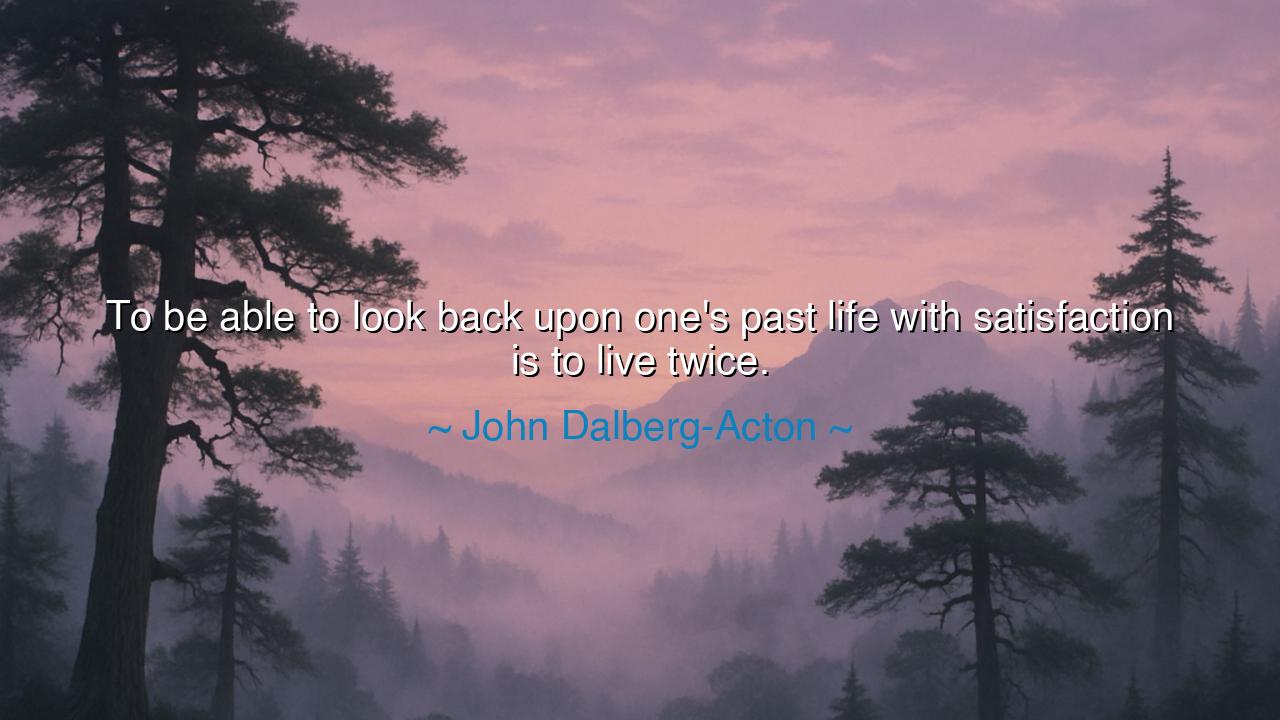
To be able to look back upon one's past life with satisfaction is






“To be able to look back upon one’s past life with satisfaction is to live twice.” Thus spoke John Dalberg-Acton, the great English historian and moral philosopher, whose mind saw deeply into the nature of memory, virtue, and human fulfillment. In this elegant truth, he captures the essence of a well-lived life—that the power of reflection, of looking back upon one’s journey with peace and pride, is a second birth of the soul. To live well once is to experience the passing of time; to look back with satisfaction is to transcend it—to live again in the richness of memory, free from regret, and full of gratitude.
Lord Acton, as he was known, was not merely a scholar of politics and history; he was a scholar of conscience. Best remembered for his declaration that “power tends to corrupt, and absolute power corrupts absolutely,” he lived his life in pursuit of moral integrity and intellectual honesty. The quote before us comes from his reflections on the moral dimensions of human existence. To him, the greatest success was not found in wealth, fame, or even achievement, but in inner harmony—in reaching the end of one’s days able to look backward without shame, to see the struggles, triumphs, and choices of one’s past not as wounds but as chapters in a noble story. For in that sacred act of remembrance, one lives again—not in time, but in meaning.
The ancients knew this wisdom well. The philosopher Seneca once said, “As long as you live, keep learning how to live.” He, too, believed that reflection was a form of rebirth, that to examine one’s life was to enrich it beyond measure. Memory, when united with gratitude, becomes a form of immortality. Every moment appreciated, every lesson embraced, lives again in the mind and heart of the one who remembers. This is what Acton meant by “living twice”: first, in the experience of life itself, and second, in the contemplation of it—with joy rather than bitterness, with wisdom rather than sorrow.
But few reach that state without struggle. To look back with satisfaction requires courage while living—to act rightly, to choose honor over ease, to forgive instead of hate, to endure pain without surrendering one’s soul. For the past does not become beautiful by accident; it is shaped by the choices we make when the future is still unwritten. Consider Nelson Mandela, who, after twenty-seven years of imprisonment, emerged without vengeance in his heart. When he looked back upon his life, he saw not wasted years, but a journey that had refined his spirit and prepared him for greatness. Because he lived with purpose, he could later look back with peace. Thus, his life became doubled—once in endurance, and again in triumph.
There is also within Acton’s quote a quiet warning: that many live without ever truly living, and so when they look back, they see only regret. The soul that chases fleeting pleasures, that sacrifices integrity for gain, may possess much in life but has little to revisit with pride. Such a person, upon reflection, finds emptiness instead of satisfaction, ashes instead of memory. To live twice, one must first live rightly—to fill the first life with courage, compassion, and truth. Only then does the second life, the life of reflection, become a joy rather than a torment.
To live twice, then, is not merely to exist, but to live consciously—to be present in one’s actions and awake to one’s values. It means to pause and take account of one’s days, to measure them not by their length but by their depth. The wise keep an inner journal, written not in ink but in gratitude. Each act of kindness, each moment of forgiveness, each time one chooses love over pride, becomes a seed of joy that will bloom again when the years have passed. For in the end, no one can escape the mirror of the past—but those who have lived with honor will find in that mirror not sorrow, but serenity.
So, my child of fleeting time, take heed of this teaching: live now in such a way that your future self may bless your memory, not curse it. Let each day be worthy of reflection. Do not postpone peace for later years, for the second life begins only when the first is lived with intention. Keep your heart pure, your word true, and your spirit open to wonder. When you reach the final chapters, may you look back and say, “It was a good life,” and in that moment, live again through the beauty of all that you were.
Thus, Lord Acton’s wisdom becomes eternal: “To be able to look back upon one’s past life with satisfaction is to live twice.” The first life is the journey through the world; the second is the harvest of meaning that memory bestows. One belongs to time, the other to eternity. Live, therefore, as one who seeks not only to breathe, but to remember with joy—and you shall live, not once, but twice in the fullness of the human soul.






AAdministratorAdministrator
Welcome, honored guests. Please leave a comment, we will respond soon